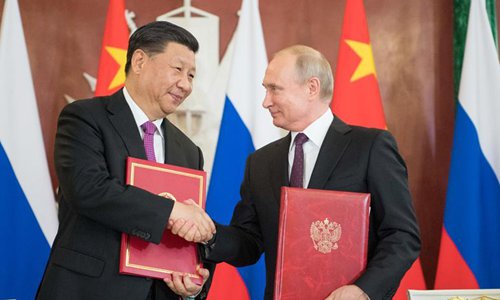HOME >> OPINION
China, Russia draw closer in face of Cold War II
By Yury Tavrovsky Source:Global Times Published: 2019/6/11 21:03:40

File Image: Xinhua
President Xi Jinping has opened a new chapter in the history of Russia-China relations. During his recent visit to Russia, he and President Vladimir Putin signed a joint statement to upgrade bilateral ties to a comprehensive strategic partnership of coordination for a new era.
For me and other Russian China watchers, this formula sounded important. Yes, our relations now are much better than during the late Soviet period under Mikhail Gorbachev or Boris Yeltsin. Even early Putin years were not as multifaceted and warm as now. The Treaty of Good Neighborliness and Friendly Cooperation in 2001 as well as the final demarcation of the joint border in 2004 established a solid foundation for further progress. Still, both Moscow and Beijing were looking in different directions.
The situation changed for Moscow in 2007 when Putin finally realized the inherent hostility of the West toward Russia. His famous address at the Munich Security Conference put an end to illusions in the Kremlin about the West and in the West about Putin. The open containment on Russia had started.
Containment on China started a few years later. The "Pivot to Asia" strategy was put forward by former US president Barack Obama followed by the Trans-Pacific Partnership (TPP) that excluded the major Pacific trading nation - China. Republican US President Donald Trump inherited the hawkish stance.
I think some Chinese experts on America in recent years made several major miscalculations on China-US relations. There are also many "romantics" in Moscow. They can be found not only among experts and journalists but also in some very high places. Financial policy is oriented to US-controlled IMF and World Bank. Even economic sanctions and military pressure can't make these people see reality.
Fortunately, there are enough realists in the Kremlin. They clearly see the essence of American hostility to Russia which can be called the Cold War 2.0. A resource-rich Russia with an independent military and foreign policy is unacceptable to the White House.
Still it is now evident that Washington is ready for confrontation simultaneously with both Russia and China. In the Trump administration's 2018 National Security Strategy, both nations are believed to have challenged the US. In view of the trade and tech war with China and sanctions against Russia as well as accusations that both have interfered in American politics, their drawing closer becomes inevitable.
In the early 1970s when the Soviet-Chinese confrontation was at its peak, there was a joke in Moscow: "Optimists must learn English, pessimists Chinese while realists should practice using the AK-47." Nowadays optimists in Russia learn Chinese but realists continue to practice firing the AK-47. More and more people understand or at least feel that Russia-US confrontation is not temporary but existential. Everything Russian - the people, language and products - is not welcome, despised and banished. Anti-Russian hysteria borders on chauvinism. It also resembles the infamous "Chinese Expulsion Act" of 1882. Racist traditions in the US are still alive even now. Kiron Skinner, director of policy planning at the US State Department, said on April 29 that Washington is formulating a strategy against China based on the idea of "a fight with a really different civilization."
When he was asked in St. Petersburg if he would take sides in the trade war between the US and China, Putin mentioned an old Chinese proverb about the wise monkey atop the mountain looking down on two tigers battling each other in the valley. Instead of squabbling, Moscow and Beijing are getting closer every year. The strategic partnership of the past years has yielded results, especially in the field of security.
The strategic partnership for China and Russia has benefits for both as they push to attain development goals and counter Trump's protectionism. But the new global realities and intensifying attempt at containment pushed Putin and Xi to the next step of the ladder - "comprehensive strategic partnership of coordination for a new era." It is not the military alliance like one under the Sino-Soviet Treaty of Friendship, Alliance and Mutual Assistance of 1950. Yet it is a clear and loud signal to Washington that the new cold war will simultaneously have two fronts - China and Russia.
Only coordinated strategic planning and mutual assistance between Russia and China can guarantee success in pushing back at Cold War 2.0.
The author is president of "Russian Dream-Chinese Dream" analytic center of the Izborsk Club. opinion@globaltimes.com.cn
Posted in: VIEWPOINT